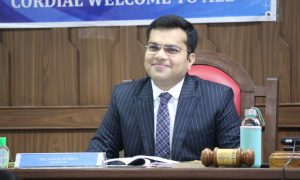 Apeksha Mehta is a graduate from National Law Institute University, Bhopal (Batch of 2014). She has participated in various co-curricular activities and has multiple publications to her name. Her diligence paid off when she received a job offer from Lakshmikumaran & Sridharan (LKS) in her 5th year of law school. Currently, she is working as an Associate there. We asked her to share her experiences and strategies she used over the years.
Apeksha Mehta is a graduate from National Law Institute University, Bhopal (Batch of 2014). She has participated in various co-curricular activities and has multiple publications to her name. Her diligence paid off when she received a job offer from Lakshmikumaran & Sridharan (LKS) in her 5th year of law school. Currently, she is working as an Associate there. We asked her to share her experiences and strategies she used over the years.
In this interview, Apeksha talks about:
- Trimester system at NLIU
- Importance of co-curricular activities
- Few tips on framing CV
- Securing a job at LKS
Tell us about your pre-college life as well as educational background. Why did you decide to study law?
I belong to Ratlam in Madhya Pradesh and I completed my schooling from the same place. I have always been an average student. However, I think I managed fairly well, despite my sluggish attitude towards studies. I am a first generation lawyer in my family. My interest in law developed gradually when I started exploring the options I had after 12th standard. I researched about law schools, the subjects, design of the five year law course and the opportunities it bestows thereafter and found it akin to my liking.
First year of law school usually determines a lot about how the rest of the four years will be. It can also be very challenging. What was your experience?
I will not prefer to call it challenging. Law school or for that matter any professional degree course is a start of a new phase in a student’s life. It is different, it amuses you and you are more than ready to go with the flow. First year of law school actually determines very little about the coming four years. But, it anyways builds your foundation. It teaches you how to go about the rest of the college life. Every year is a new experience in itself. I scored decently in the first trimester which developed a sense of fear regarding the coming trimesters as to keeping the score constant since every trimester introduced heavier subjects than the last trimester. But the first year of law school I think is the best amongst all the years as there is comparatively less pressure and far less competition.
One can find it difficult to manage continuous evaluation through trimester exams, projects, submissions, etc. in a law school. How did you manage your studies?
Many people from other colleges think that a trimester system is difficult to manage. However, if you get into the routine of studying in a trimester system, it isn’t very difficult at the end of the day. It might get exhausting at some point of time, but it doesn’t entirely tire you out. All you need to have is interest in what you are pursuing and the rest follows.
How much time does it take to manage academics properly in a law school like NLIU, especially in light of the trimester system?
According to me, it should take you two trimesters at the most. Everything is new for a student in the first trimester. But, by the end of the first trimester itself, you start understanding how much more you need to put in to score good, or how frequently you need to participate in the co-curricular or extra-curricular activities. Of course, such realisation strikes only if you make the effort of planning out your schedule for the coming trimester.
How would you describe your time at NLIU-Bhopal? What are the co-curricular activities you took part at NLIU?
NLIU brought about a lot changes in how I perceived things before joining college. I got a lot more disciplined towards my studies. As a law student, I became more aware and more responsive towards my surroundings. National Law Schools offer ample of opportunities to explore one’s area of interest within law. I was more inclined towards paper publications and presentations. I have presented a paper entitled ‘Fairness Opinion of Independent Directors in Takeovers’ at a conference on independent directors at NLU, Jodhpur. I have also written an article entitled ‘Dumping: It’s Fair Unless it’s all Politics’ published in the A38 Journal of International Law.
Which internships that you have pursued will you consider to be right at the top and why? Tell us about some interesting internship experiences.
My internship experience at Nishith Desai Associates is what I would describe as the best. The variety of work and the work culture that I got to experience there was amazing. Besides Nishith Desai Associates, Jyoti Sagar Associates and Link Legal were also very good learning experiences. The appreciation for good work that you get as an intern boosts your morale. Internships also polish your research skills. While interning at Link Legal, I was asked to research on execution of a high court order in case of a merger. The client did not want to go ahead with the merger despite the order being passed by the court. I researched and found some noteworthy cases which helped save the client thus putting me in the good books of the partner and also helped me secure a call back.
What are the skills you learned from internships? How did you ensure that you get noticed during internships for the work you do?
Apart from a drastic improvement in your research skills, internships bring you a lot closer to how law works in real life. You apply the law to real life facts and hence, it helps you to learn to read between the lines and deduce the point of law which the client may have missed or may have misinterpreted. It also teaches you that sometimes there is no solution to the client’s problem and brings you out of the fantasy world of Mike Ross and Harvey Spector who always manage to find a solution for the client. Internships teach you a lot about the benefits of socialising, networking and also how do you deal with the expectations of a client. The best part about interning is that it keeps you posted regarding the industry.
What brought you towards Tax Law?
When my fifth year started and the time for placements was near, I decided I will not narrow down my choices to some particular areas of law. I knew I want to start my career with a law firm job and that was my sole aim. I had a previous internship experience with LKS and so I had an idea of the kind of work they do. Nothing about tax was new to me as such and hence, I did not mind giving myself a chance to work in this area.
You secured a job at Lakshmikumaran & Sridharan (LKS) in your 5th year of law school. How did you go about achieving this?
If you know what the recruiter expects from the person sitting in front of them, it gets a little easier to crack the interview. At the time LKS came to our campus, they had a 5 day lecture series scheduled, which gave us a fair idea about the working of the firm, work culture, the areas of law they deal in and what do they expect from freshers who join them. I also had the advantage of an internship experience at LKS, so I think I was in a better position as compared to others to decipher the expectations of the recruiter.
LKS basically doesn’t expect you to know the tax law at length. What they expect is that you know the basic law and you have enough sincerity to join the firm. I studied the basics of indirect and direct taxation apart from whatever else was there on my CV.
How many times did you intern at LKS before you bagged the job offer? Please tell us about the recruitment application process at LKS?
I interned at LKS once at the end of my third year. I got recruited through the campus recruitment program in our college. The campus recruitment program at LKS involves shortlisting of CV’s of candidates who are desirous to sit for the interview. Thereafter, an interview is conducted with each of the shortlisted candidates.
What kind of questions were you asked during the interview with LKS?
They started off with making me comfortable by asking me about my city and family. Eventually, they started asking questions from the LKS internship and other internships. The majority of questions related to indirect taxation (sales tax, service tax and excise law) from my LKS internship, SEZ/EOU related questions, a few IPR related questions and FDI related questions from my other internships. They also asked me questions related to the certificate courses I pursued in Maritime Law and Legal and Financial Services.
How do you think one should go about writing a CV when one is applying for a job?
One should definitely very clearly mention the work done during the internships. Recruiters pay a lot more attention on the variety of work that the candidate has undertaken. A diversified CV is an interesting CV. Internship is not a time for you to select one area of law or practice and continue interning in the same. The idea is to explore and keep exploring until you find what interests you. Also, from my personal experience, if you are keen on getting through a law firm at the starting of your career, you should start interning in law firms right after your second year. Getting a job also depends a lot on the grades that you score. You need not be the topper of your batch, but a decent grade might also sometimes help you land a job interview.
Many law school students struggle to secure a job. What do you think they are doing wrong, from your observations?
A majority of students look at big law firm jobs as a matter of social eminence. This is a wrong approach and a totally inappropriate attitude for a person who is just starting his/her career. If it is difficult for you to determine your area of interest right at the start, have patience and slowly move towards something which allures you. If you know what attracts you then go ahead and grab the job that you think is fit for you. There are a number of mid-tier law firms which are excellent in their respective areas. Try to look beyond big names. Apart from this, the way you present your CV especially the cover letter makes a lot of difference. If all this is fine, then it totally depends on how your interview goes.
Lastly, what would be your message to our readers?
After having spent 4 months in the professional sphere soon after college, I realise there should be an alteration in the way students usually study at law schools. Trimester system or no trimester system, what is needed is a strong foundation to be built. So, even if you are being taught only case law ‘x’ in the classroom, make sure you have knowledge of what the status of the case was right when it came before the court. I know it is easier said than done. But, you will realise the importance of a strong foundation when you start working. I am stressing on the need of a strong foundation because any place you join after college expects you to know the basics. They make sure you turn into excellent lawyers, but they will only recruit people who have got their basics right.
























